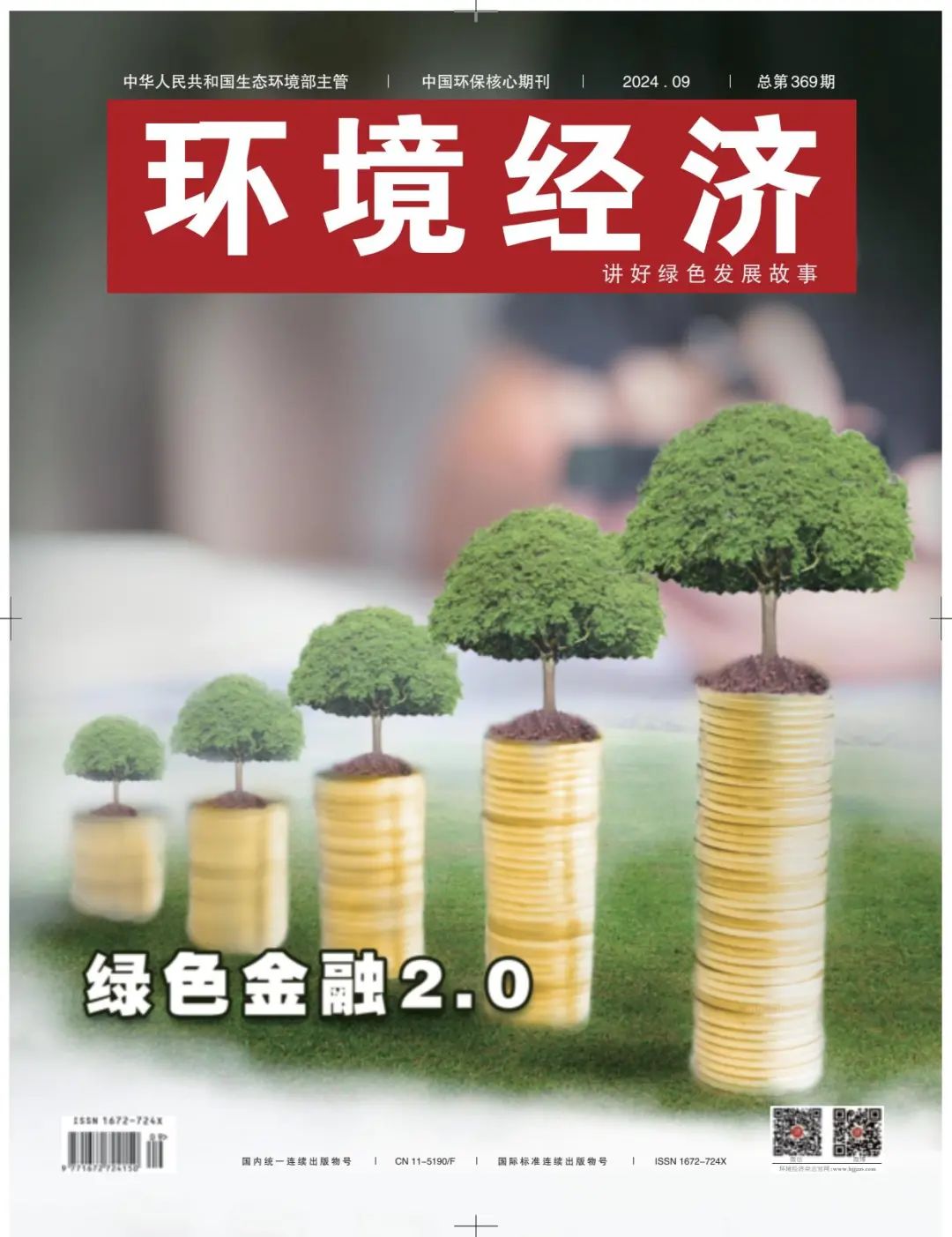Series ②: Preliminary construction of a multi-level green financial product system

As one of the important infrastructures for the development of green finance, the issue of the standard system of green finance has attracted attention and discussions from all parties.
The reporter noted that the "Guiding Opinions on Further Strengthening Financial Support for Green and Low-Carbon Development"(hereinafter referred to as the "Guiding Opinions") put forward clear requirements around optimizing the green finance standard system.
"It is very necessary to optimize the green finance standard system." During the interview, many experts told reporters that the optimization of the standard system can improve the comparability and transparency of financial products, reduce environmental risks, and promote the healthy development of the green financial market. Through a unified standard and certification system, we can increase the recognition of green financial products by all parties, increase investor confidence, and attract more funds to invest in green and low-carbon fields. At the same time, it will help improve the risk management capabilities of financial institutions and reduce the risks of green financial business.

There is a relatively lack of standard guidance in the low-carbon field
The "standard system" is also regarded by the industry as the foundation for the development of green finance. The "Guiding Opinions" clarify that the requirements for the construction of the green finance standard system are further enriched, especially proposing a series of optimization measures for the use of funds raised by green bonds, evaluation and certification, carbon accounting and information disclosure.
During the interview, Li Zhiqing, executive director of the Green Finance Research Center of Fudan University, told reporters that in recent years, my country has made significant progress in the construction of green financial product standards. For example, carbon accounting standards and carbon information disclosure standards have been established, and some places have also issued catalogs for promoting transformation finance. Next, the work of improving standards should go deeper. For example, disclosing greenhouse gas emissions involves the methodology of greenhouse gas emission sources. In short, it is necessary to continuously refine and improve it.
"After years of development, banks and other financial institutions have regarded green finance as an important task, Bank of Communications and others have regarded green as the background of corporate development, and some banks have regarded support for green industries as the focus of business development." Li Zhiqing introduced that regulatory agencies have also established a clear assessment mechanism for the scale and structure of green finance. Currently, green finance business accounts for 10% to 15% of major banks.
What needs to be faced up to is that my country still faces some challenges in the construction of the green finance standard system. Bao Jie, co-director of the ESG Center of the International Institute of Green Finance at the Central University of Finance and Economics, said that my country's current unified standards for green finance have not yet been established, complete and comprehensive, and there are still many financial instruments that lack guiding standards to support green and low-carbon industries. At the same time, early green finance standards focused more on the field of green environmental protection, but relatively lacked guidance on the low-carbon field.
"Therefore, in this year's newly revised" Guidance Catalogue for Green and Low-Carbon Transformation Industries (2024 Edition)", we see that some emerging key industries for green and low-carbon transformation have also been included. This is also the direction in which other green finance standards need to be continuously improved." Bao Jie said.
Green finance standards also face the problem of compatibility with international standards. In Bao Jie's view, my country's supervision has always paid close attention to the development of international sustainability and green standards, and has also continued to promote work such as the China-EU Common Classification of Sustainable Finance.
Bao Jie said that on the whole, sustainable or green finance work in countries around the world is carried out under the United Nations Sustainable Development Goals. In terms of purpose, it has long-term consistency. In terms of global standard compatibility, we can refer to the common classification catalog work currently promoted. Practical experience and jointly explore the compatibility of standards.
"Support regulatory agencies to accelerate the promulgation of unified green financial market and green financial product standards, such as carbon accounting standards, transformation finance standards, and green financial product standards, to help financial institutions carry out carbon emission management and statistics for business activities and investment and financing businesses, and carry out work such as identification and definition of categories of green and transformation projects to provide a foundation for the innovation of green, transformation, and carbon financial products, so as to better play the role of mobilizing social funds to support the development of low-carbon fields." Guo Hongyu, deputy director of the Beijing Green Research Public Welfare Development Center, said.
Pan Gongsheng, governor of the People's Bank of China, proposed at the symposium on green finance services for building a beautiful China that financial management departments should cooperate with ecological and environmental departments, financial institutions, and enterprises to systematically sort out the green finance standard system and improve the systematicness and standardization of green finance standards. Sex, authority and enforceability.
This also means that the green finance standard system is expected to be further improved.
Promote the financial system to gradually carry out carbon accounting
At present, the carbon accounting requirements of financial institutions are receiving increasing attention.
Regarding the carbon accounting of financial institutions, the top-level design has successively issued a number of policies to guide the carbon accounting path of financial institutions. In 2019, the former Insurance Regulatory Commission of the Bank of China issued the "Guidelines for Calculating Energy Saving and Emission Reduction of Green Credit Projects", which provided methods for calculating carbon benefits and also provided benchmarks for calculating energy saving and emission reduction of green credit projects. In 2021, the People's Bank of China issued the "Guidelines for Environmental Information Disclosure of Financial Institutions" to put forward disclosure requirements for carbon accounting for investment and financing business of financial institutions; at the same time, it issued the "Technical Guidelines for Carbon Accounting for Financial Institutions (Trial)" to help financial institutions calculate themselves and their Carbon emissions and carbon emission reductions related to investment and financing businesses, support the expansion of the scale of green and low-carbon investment, clarify the carbon emission reduction effect of investment and financing businesses, and promote the carbon accounting pilot of financial institutions.
For financial institutions, carbon accounting methods and data sources for enterprises and assets are important prerequisites for the financial industry to carry out climate transition risk analysis and environmental information disclosure. The carbon accounting of financial institutions is mainly reflected in two aspects: on the one hand, the financial institutions 'own carbon emissions and carbon emission reductions in their operating activities, and on the other hand, the carbon emissions and carbon emission reductions generated by their investment and financing activities. In addition to identifying and controlling the carbon emissions generated by one's own business activities, it is also necessary to promote the transformation of the investment and financing activity structure of financial institutions from high-carbon energy-consuming enterprises to low-carbon and environmentally friendly.
"This requires financial institutions to establish a sound and complete carbon accounting system that can better plan and implement carbon reduction measures." Li Zhiqing said.
The reporter noted that the "Guiding Opinions" put forward detailed arrangements for the construction of related systems such as methodologies, databases, standards, data management and statistics involved in carbon accounting of financial institutions: Establish and improve carbon accounting methods and databases for financial institutions, strive to promote the application of mature carbon accounting methods and results in the financial system, formulate and promulgate unified carbon accounting standards for financial institutions and financial businesses, and promote financial institutions to strengthen their own and their investment and financing related businesses. Management and statistics of carbon emissions data. Improve the standardization, authority and transparency of carbon accounting for financial institutions. Encourage financial institutions and enterprises to use big data, financial technology and other technical means to provide technical support for carbon accounting.
Guo Hongyu said that the impact of climate change brings systemic risks to the financial sector. At the same time, financial institutions are facing physical risks and transformation risks brought by climate change and urgently need the ability to identify and manage climate-related financial risks.
"Whether it is conducting climate risk stress tests in China's financial system, or conducting financial institutions to identify and manage climate-related financial risks and assess project-level climate performance, carbon emission data is indispensable." Guo Hongyu told reporters that the current carbon emission data foundation is relatively weak. Promoting the financial system to gradually carry out carbon accounting will provide a solid data foundation for the financial system and financial institutions to identify and manage climate risks and assess the climate performance of financial institutions.

Research on new transitional financial standards
Transformation finance serves the low-carbon transformation of high-carbon industries and helps promote the continuous increase in the proportion of green industries and green projects in economic activities. Recently, many specific practices have been implemented in the field of transformation finance, but they still face development difficulties such as small product scale, standards still to be established, and incentive mechanisms yet to be improved.
Some banking industry insiders told reporters that many high-emission entities that do not yet meet green standards have difficulty obtaining financing to support their low-carbon transformation. At present, the financial system is less willing to provide financial support to non-green industries and enterprises. How to effectively identify entities with the will, technology and ability to achieve green transformation and development is a major problem facing financial institutions.
Ma Jun, president of the Beijing Institute of Green Finance and Sustainable Development, publicly stated that transformation is a process. Without a reliable and scientific transformation plan, there may be risks of "false transformation" and "green washing" in transformation finance. Some banks have not yet established a framework and process for transition finance, mainly due to the lack of transition finance standards.
"A framework and system for transformation finance need to be established, which should include definition standards, disclosure requirements, transformation plans, etc. In addition, banks need to have a set of access requirements to determine which companies can receive transformative financial services." Ma Jun said.
At present, my country's standards in the field of green finance are becoming increasingly perfect, but national-level transformation finance standards have yet to be launched. Accelerating the research and formulation of national transformation finance standards is the focus of attention of all parties at present.
Li Zhiqing told reporters that in the "version 2.0" of the green finance standard system, there is basically not much change from the "version 1.0", and the biggest incremental change is transformation finance. The "Guiding Opinions" add new research and formulation of transformation financial standards, and propose to study and formulate transformation financial standards and related policy systems: "Accelerate the research and formulation of transformation financial standards, include qualified industrial green development projects, etc. into the scope of support, and clarify the catalog of transformation activities. Core elements such as disclosure requirements, product systems and incentive mechanisms."
Industrial Research stated that in fact, the core elements of transitional financial policies are basically consistent with the "G20 Transitional Financial Framework" formulated by the People's Bank of China, and my country's transitional financial policy system is expected to be formulated and improved under this framework in the future. In the process of promoting the formulation of transitional financial standards, there are also many challenges. For example, my country's transitional financial standards must not only conform to my country's national conditions and development stage, but also be in line with the international transitional financial framework, and how to explore and formulate local transitional financial standards. Achieve synergy and unity with national transitional financial standards.
Guo Hongyu said that to speed up the formulation of transformation financial standards, we must first include qualified key industries into the scope of support, clarify elements such as the catalog of transformation financial support activities, disclosure requirements, product systems and incentive mechanisms, and at the same time establish supporting mechanisms for fair transformation. It is worth mentioning that the transformation finance catalog needs to have a clear time frame. With the development of low-carbon transformation technologies, the content of the catalog will be updated every one or two years to continuously strengthen the technical requirements for low-carbon transformation.
At this stage, the People's Bank of China has begun to conduct research on the compilation of a transformation finance catalog and related supporting policies in key industries. The initial research covers the four major industries of thermal power, steel, building materials and agriculture. When conditions are ripe, opinions will be publicly solicited and released publicly., providing a basis for meeting the reasonable financing needs of low-carbon transformation of high-carbon industries.
It is reported that in recent years, the China Association of Interbank Market Dealers and exchanges have launched transitional bond financial products. Hebei, Chongqing, Huzhou, Shanghai, Hunan, Shanxi and many other places have introduced or are in the process of introducing standards and systems for local transformation finance.
What needs special attention is that Li Zhiqing reminded that in the process of forming standards for transition finance and climate investment and financing, carbon accounting and carbon information disclosure may also be formed, and the standards and requirements of international green finance need to be specifically benchmarked.
line with international standards
Actively expanding the international cooperation space in green finance is one of the "five pillars" of my country's green finance policy system. This requires my country's green finance standards to gradually integrate with international standards and actively participate in the formulation of international standards. "Addressing climate change is a typical international public good. Without international coordination and cooperation, the problem of 'free riding' will arise." Ma Jun emphasized the importance of strengthening international benchmarking.
It is reported that at present, more than 20 countries and regions such as China, the European Union, and the United Kingdom have established or are establishing their own green industry catalogs and project classification standards. However, different economic development stages, industrial structures, and lack of communication and cooperation have caused these countries and Regions have obvious differences in green industry classification frameworks, green finance project identification, environmental risk management processes, and ESG information disclosure, which restrict international cooperation and investment in green finance.
Guo Hongyu said that my country plays an active role in promoting the establishment of an international platform for green finance and carrying out international cooperation. In recent years, the international cooperation that my country has led, promoted and actively participated in includes the G20 Sustainable Finance Working Group and the Central Bank's Green Finance Network (NGFS), the Belt and Road Green Investment Principles (GIP), the International Cooperation Platform for Sustainable Finance (IPSF), and cooperation between China, Britain and France on green finance.
On the basis of respecting differences in economic and social development levels between countries, my country narrows differences in green finance standards between regions and promotes the formulation of relevant international standards. Guo Hongyu said that the "Guiding Opinions" once again clarified the importance of benchmarking with international standards. The synergy of domestic and foreign standards not only helps Chinese financial institutions and enterprises to invest overseas, but also provides a basis for China to participate in the formulation of international standards.
On the basis of improving domestic green finance standards, we will promote our own development experience, participate in the formulation of global and regional green finance standards, and contribute Chinese wisdom while improving the compatibility of domestic and international green finance standards. Guo Hongyu said that in the future, on the basis of improving the domestic green finance standard system, my country can promote the "going global" of my country's green finance standards through the G20, bilateral green gold cooperation, and the "Belt and Road" initiative, and actively cooperate with other countries or Regions, international development financial institutions, etc. carry out bilateral and multilateral cooperation, carry out mutual recognition of standards with countries or regions that have established standards, and carry out innovation in green financial products according to local conditions. Promoting the integration of green finance standards with international standards will also help enhance international voice and market influence.
"In addition, for countries or regions that have not established standards (especially developing countries), China can help them establish green finance-related standards through policy dialogue, knowledge sharing and capacity building, develop green financial markets, and create a convenient environment for international investors. A green and low-carbon investment environment." Guo Hongyu said.
As the world's major green finance market, my country will build a more open and compatible green finance standard system, improve the internationalization mechanism of green finance standards, and promote the mutual comparison, recognition, adoption and transformation of Chinese and foreign standards. This is not only my country's contribution to achieving global carbon neutrality. The responsibility of the goal is also a historical opportunity for my country to "change lanes and overtake" in the financial field to move towards the forefront of the world.







